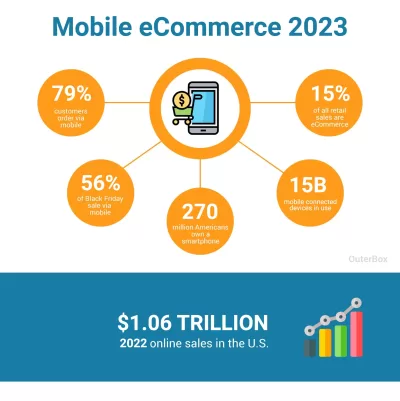Table of Contents
New ecommerce trends and innovations emerge all the time. As a business owner, it’s important to stay up-to-date on the latest ecommerce trends and innovations to remain competitive and meet the needs of your customers. Likewise, as a consumer, staying informed on the latest trends can help you make better purchasing decisions and take advantage of new technologies and services.

One of the biggest ecommerce trends is the continued growth of online shopping. With more and more consumers opting to shop online, businesses are looking for new ways to improve the online shopping experience and make it more convenient and efficient. This has led to a number of innovations in areas such as mobile shopping, social commerce, and personalized shopping experiences.
Other ecommerce trends shaping the industry include the increasing use of artificial intelligence (AI) and machine learning. These technologies are being used to improve everything from product recommendations to customer service and are helping businesses to better understand their customers and provide more personalized experiences. As AI and machine learning continue to evolve, we can expect to see even more exciting innovations in the world of ecommerce.
1. Consumer Behavior Ecommerce Trends
As the ecommerce industry continues to grow, consumer behaviors are also evolving. This section presents some of the emerging trends in consumer behavior and how they are shaping the future of ecommerce.
Mobile Shopping and Smartphones
Mobile shopping is becoming increasingly popular among consumers, and smartphones are the primary device used for online shopping. According to Digital River, mobile commerce is expected to account for 72.9% of all ecommerce sales by 2021. The ecommerce trends around this dynamic are driven by the convenience of shopping on the go and the increasing availability of mobile-friendly ecommerce websites and apps.

To cater to this trend, ecommerce businesses must ensure that their websites and apps are optimized for mobile devices. This includes having a responsive design, fast page load times, and easy navigation. Additionally, businesses can leverage mobile-specific features such as push notifications and location-based marketing to enhance the shopping experience for their customers.
Social Commerce and Engagement
Social media is no longer just a platform for connecting with friends and sharing photos. It informs powerful ecommerce trends that allow businesses to engage with customers and drive sales. Social commerce involves using social media platforms to sell products directly to customers.
According to HBR, “social commerce is expected to reach $84.2 billion by 2024.” This trend is driven by the increasing use of social media by consumers and the ability of businesses to leverage user-generated content and social proof to drive sales.
To take advantage of such ecommerce trends, businesses must have a strong social media presence and engage with customers on a regular basis. This includes creating engaging content, responding to customer inquiries and feedback, and leveraging social media influencers to promote their products.
Personalized Shopping Experiences

Consumers today expect a personalized shopping experience, and ecommerce businesses must deliver on this expectation to remain competitive. Personalization involves tailoring the shopping experience to the individual customer based on their preferences, behavior, and purchase history.
To deliver a personalized shopping experience, ecommerce businesses must collect and analyze customer data to understand their preferences and behavior. This includes tracking website interactions, purchase history, and social media activity. Using this data, businesses can then personalize the shopping experience by recommending products, offering promotions, and providing targeted content.
In conclusion, as consumer behaviors continue to evolve, ecommerce businesses must adapt to stay relevant and competitive. By embracing mobile shopping, social commerce, and personalization, businesses can create a seamless and engaging shopping experience for their customers.
2. Technological Advancements ECommerce Trends
As ecommerce continues to grow, technological advancements have played a vital role in shaping the industry. In this section, we will discuss some of the most significant technological advancements affecting ecommerce trends.
AI and Machine Learning
Artificial intelligence (AI) and machine learning are transforming the ecommerce industry by allowing businesses to provide personalized experiences to their customers. AI-powered chatbots are becoming more common in online stores, providing 24/7 customer support and assistance.

These chatbots can help customers find products, answer questions, and even process orders. AI-powered personalization is also becoming more prevalent, with businesses using data analytics to offer personalized product recommendations and promotions based on a customer’s shopping behavior.
Augmented and Virtual Reality
Augmented reality (AR) and virtual reality (VR) are also a significant part of current ecommerce trends revolutionizing the way customers shop online. AR allows customers to visualize products in their own environment, giving them a better idea of how the product will look and feel. VR, on the other hand, allows customers to experience a product in a virtual environment. This technology is particularly useful for products that are difficult to visualize, such as furniture or clothing.
Voice Search and Voice Assistants
Voice search and voice assistants are becoming increasingly popular among consumers, making them ecommerce trends worth learning about and implementing. Customers can use their voices to search for products, make purchases, and even track their orders. Voice assistants such as Amazon’s Alexa and Google Assistant can also provide personalized recommendations based on a customer’s shopping history.

Simply, technological advancements such as AI and machine learning, AR and VR, and voice search and voice assistants are key ecommerce trends that are shaking the online business space. As technology continues to evolve, we can expect to see even more innovations that will shape the future of ecommerce.
3. Innovative Business Models as ECommerce Trends
Innovative business models have transformed the ecommerce landscape, pushing the frontier of what is possible to buy and sell online. Here are three innovative ecommerce business models that have been gaining traction in recent years: subscription services, direct-to-consumer (DTC) trends, and B2B ecommerce growth.
Subscription Services
Subscription services offer a recurring revenue model that has become increasingly popular in recent years. This model provides customers with a convenient way to receive products or services on a regular basis, while also providing businesses with a steady stream of revenue. Subscription services have been successful in a variety of industries, including beauty, food, and clothing.

One of the key benefits of subscription services is the ability to personalize the customer experience. By collecting data on customer preferences, businesses can tailor their offerings to each individual customer, leading to increased customer loyalty and satisfaction. Additionally, subscription services can help businesses to forecast demand and manage inventory more effectively.
Direct-to-Consumer Trends
DTC ecommerce involves selling products directly to consumers, bypassing traditional retail channels. This model has gained popularity in recent years due to its ability to provide consumers with a more personalized experience, while also allowing businesses to cut out the middleman and increase profit margins.
One of the key benefits of DTC ecommerce is the ability to collect data on customer behavior and preferences. This data can be used to create more targeted marketing campaigns and develop new products that better meet the needs of consumers. Additionally, DTC ecommerce can provide businesses with greater control over their brand image and messaging.
B2B ECommerce Growth
B2B ecommerce trends have been changing rapidly in recent years, as businesses look for more efficient ways to purchase goods and services. This model provides businesses with a platform to connect with suppliers and customers while also streamlining the procurement process.

One of the key benefits of B2B ecommerce is the ability to automate the purchasing process. By integrating with existing procurement systems, businesses can reduce the time and cost associated with manual processes. Additionally, B2B ecommerce can provide businesses with greater visibility into their supply chain, allowing them to identify and address inefficiencies.
These innovative ecommerce business models offer businesses new opportunities to grow and succeed in the digital age. By leveraging these models, businesses can personalize the customer experience, increase profit margins, and streamline their operations.
4. Sustainability and Ethical Ecommerce Trends
In recent years, sustainability and ethical practices have become increasingly important to consumers. As an ecommerce business, it is important to understand the impact of sustainable practices on consumer trust and loyalty. Below is a discussion of the importance of sustainable products and services as well as data privacy and security.
Sustainable Products and Services
Consumers are becoming more environmentally conscious and are looking for sustainable products and services. According to a study by NuOrder by Lightspeed, sustainability is one of the top wholesale ecommerce trends for 2024. Ecommerce businesses that offer sustainable products and services have a competitive advantage over those that do not.

To meet the growing demand for sustainable products and services, ecommerce businesses can consider using eco-friendly packaging, sourcing materials from sustainable sources, and reducing carbon emissions. Offering sustainable products and services not only helps the environment but also builds consumer trust and loyalty.
Data Privacy and Security
Data privacy and security are essential for building consumer trust. According to a study by Salsify, 56% of consumers are concerned about the ethical practices of the brands they buy from. Ecommerce businesses that prioritize data privacy and security can build trust with their customers and differentiate themselves from competitors.
To ensure data privacy and security, ecommerce businesses can use secure payment gateways, encrypt customer data, and implement two-factor authentication. By prioritizing data privacy and security, ecommerce businesses can build consumer trust and loyalty.
In other words, sustainability and ethical practices are essential for building consumer trust and loyalty. By offering sustainable products and services and prioritizing data privacy and security, ecommerce businesses can differentiate themselves from competitors and build a loyal customer base.
Future Outlook of Emerging Ecommerce Trends
The Impact of COVID-19
The COVID-19 pandemic accelerated the growth of the ecommerce market, and this trend is expected to continue in the future. According to Forbes, retail ecommerce sales reached an estimated $5.8 trillion in 2023, and projections indicate continued growth. The pandemic changed the way consumers shop, and businesses have had to adapt to the new normal. As a result, businesses that have invested in their ecommerce capabilities have been able to thrive during the pandemic.
The Rise of the Metaverse
The metaverse is a virtual world that is becoming increasingly popular, especially among younger generations. This virtual world has the potential to revolutionize the ecommerce industry by creating new opportunities for businesses to sell their products and services.
According to Forbes, the metaverse is expected to become a significant part of the ecommerce industry in the future. Businesses that are able to leverage the metaverse to their advantage will have a competitive advantage over those that do not.
Global ECommerce Dynamics
One of the ongoing ecommerce trends is that the market is becoming increasingly global, and businesses that are able to expand their reach beyond their domestic markets will have a significant advantage. According to Ecommerce Fastlane, global ecommerce sales have been consistently upward, with global ecommerce sales reaching trillions of dollars annually.

The COVID-19 pandemic accelerated ecommerce adoption, with more consumers turning to online shopping for convenience and safety. Over 40% of consumers go to search engines when starting a purchase journey. This means that businesses need to have a strong online presence to reach potential customers.
In conclusion, the ecommerce trends constantly emerging, and businesses that are able to stay ahead of the curve will have a significant advantage. By investing in these evolving ecommerce trends such as the metaverse, businesses can position themselves for success in the future. Additionally, businesses that are able to expand their reach beyond their domestic markets will have a significant advantage in the global ecommerce market








